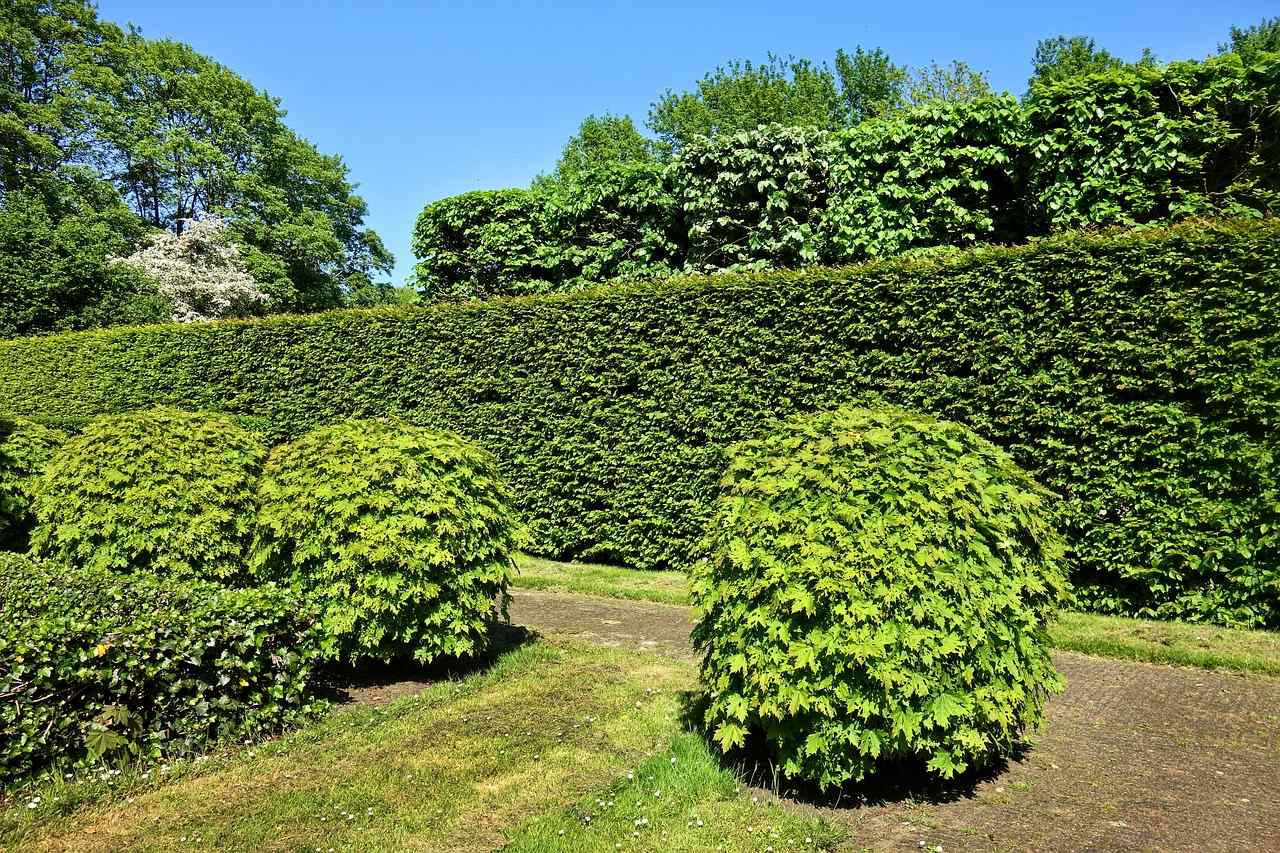When it comes to creating a natural privacy barrier, pine trees are an excellent choice due to their dense foliage and fast growth rates. They’re not just beautiful; they serve functional purposes by blocking wind and reducing noise. On this page, we will introduce you to the best options:
American Arborvitae
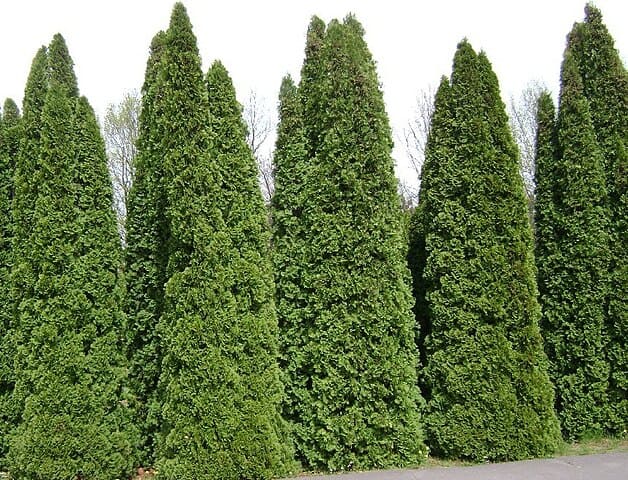
One of the most favored trees for creating privacy hedges is the American Arborvitae (Thuja occidentalis). This evergreen tree is particularly suitable for residential landscapes due to its compact form and dense, lush foliage. Growing up to 15-30 feet tall and 3-12 feet wide, it can be easily trimmed to maintain the desired height and shape.
What sets the American Arborvitae apart is its ability to thrive in various soil types and the fact that it tolerates both wet and dry conditions. This adaptability makes it ideal for homeowners who might encounter less-than-ideal soil conditions. Additionally, its dark green leaves, which can transition to a vibrant golden hue in the winter, provide year-round aesthetic appeal.
Planting American Arborvitae in a staggered row can create a robust living fence that blocks out noise and provides shelter for birds and other wildlife. Another benefit is its fast growth rate; under optimal conditions, it can grow 3-5 feet per year, quickly establishing the privacy barrier you need. For those conscious about maintenance, the American Arborvitae is relatively low-maintenance, requiring minimal pruning to keep its shape.
Austrian Pine
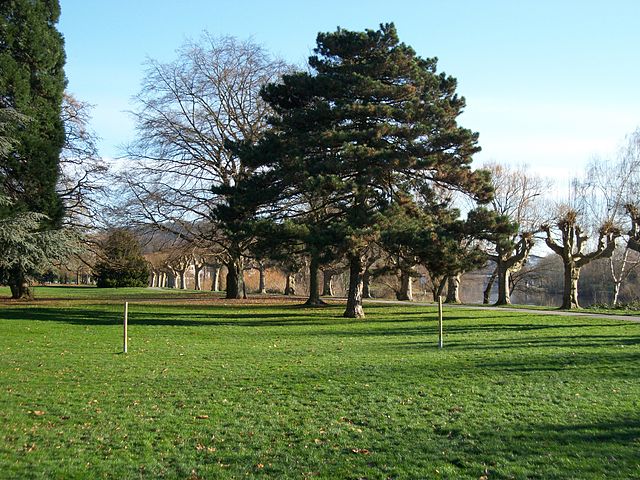
The Austrian Pine (Pinus nigra) is another strong candidate for privacy screening. Renowned for its towering growth, this tree can reach heights of 30-60 feet, making it ideal for creating an impressive vertical privacy barrier. Its robust, adaptable nature allows it to thrive in a range of soil conditions, from sandy to rocky terrains, which can be a significant plus for various geographic locations.
Austrian Pines are characterized by their long, dark green needles that grow in pairs, giving the tree a rugged appearance. This hardy tree is also resistant to drought once established, making it a suitable choice for regions with variable rainfall. The Austrian Pine’s thick branches make it an excellent privacy option, providing not only visual screening but also windbreak protection, enhancing comfort in outdoor spaces.
Another benefit of the Austrian Pine is its ability to create a natural wildlife habitat. As the tree matures, it can host a variety of birds and small animals, enriching the biodiversity of your garden. Furthermore, its minimal pruning requirements and deep root system make it a low-maintenance choice for homeowners looking for longevity and resilience in their landscaping efforts.
Black Spruce
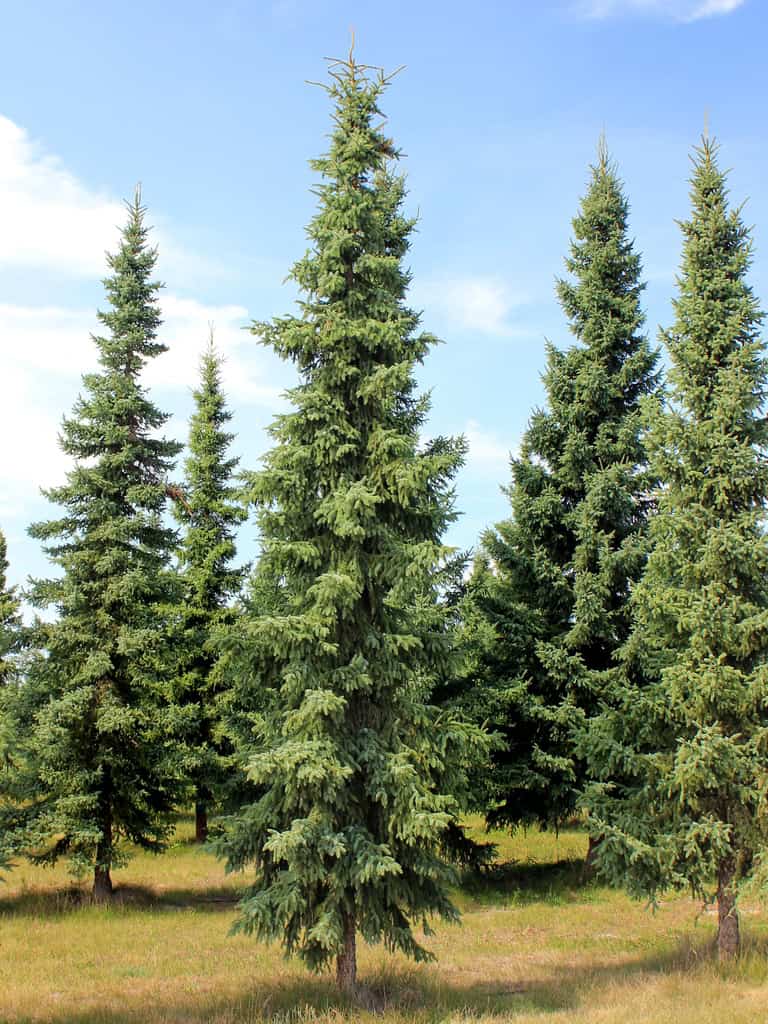
Black Spruce (Picea mariana) is a visually striking conifer that excels as a privacy tree in both rural and urban settings. Typically reaching heights of 40-60 feet with a narrow, conical shape, this tree is known for its ability to thrive in colder climates and wet conditions, making it ideal for regions where other trees may struggle.
One of the primary advantages of the Black Spruce is its dense needle foliage, which creates a thick barrier against both sight and wind, effectively enhancing privacy. Its bluish-green needles tend to remain vibrant throughout the year, providing visual interest even during winter months when many other plants lose their appeal. Additionally, the Black Spruce is relatively low-maintenance, requiring minimal care once established.
This tree also has ecological benefits; it provides habitat for various wildlife, such as birds and small mammals. Planting Black Spruce in clusters or along property lines can create a supportive ecosystem while establishing a natural privacy buffer. If you’re situated in a location that experiences harsh winters or prefers a stunning, vertical backdrop, the Black Spruce may just be the perfect choice for your privacy needs.
Black Hills Spruce
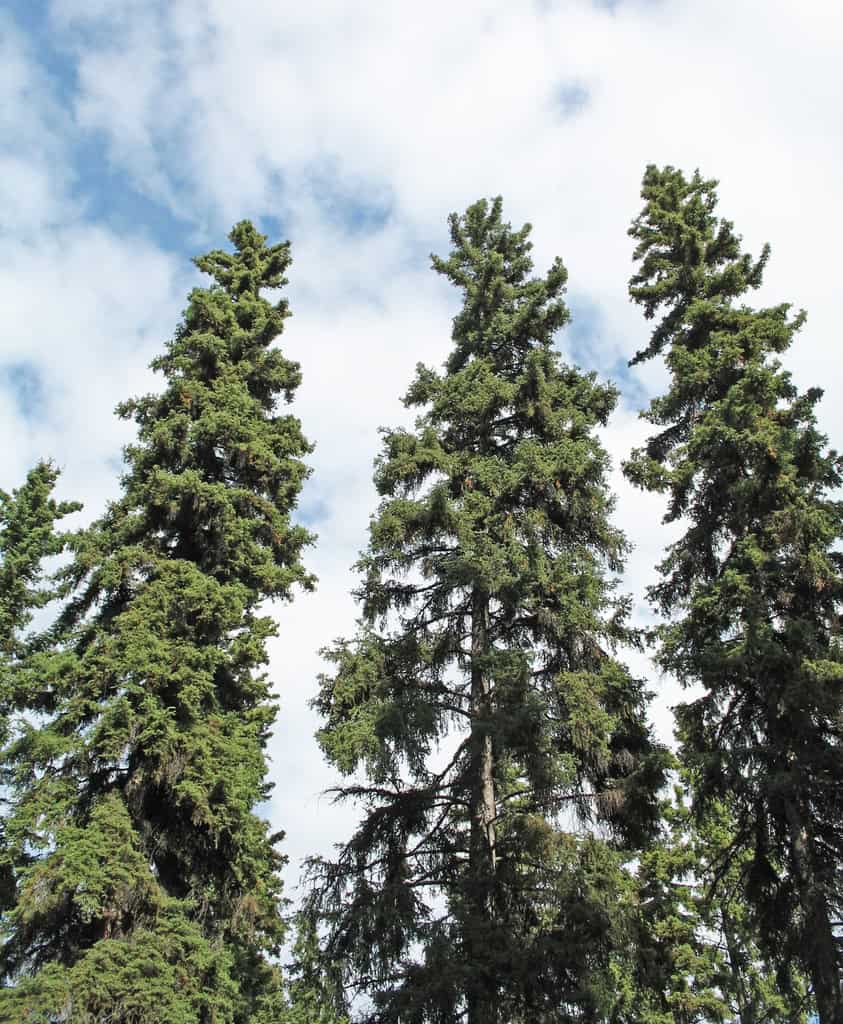
The Black Hills Spruce (Picea glauca var. densata) is a captivating variety of the white spruce and is celebrated for its striking beauty and versatility as a privacy tree. Reaching mature heights of 30-60 feet and exhibiting a rounded, dense crown, this tree can add a majestic presence to any landscape. The Black Hills Spruce is particularly noted for its hardiness and adaptability, thriving in a range of soil types, from sandy to rocky, and tolerating drought conditions once established.
One of the standout features of the Black Hills Spruce is its rich green needles that attract attention throughout the year. In winter, the tree’s full foliage can provide a stunning contrast against a snowy backdrop, preserving the privacy it offers. Additionally, its sturdy branches provide an excellent habitat for birds and other small wildlife, contributing to local biodiversity.
The dense needle coverage of the Black Hills Spruce renders it an outstanding privacy option, effectively blocking sound and visibility. It can be planted individually or in groups to create a robust privacy screen. For homeowners interested in eco-friendly landscaping, this tree’s resilience to pests and diseases simplifies garden care while ensuring a long-lasting privacy solution.
Blue Spruce
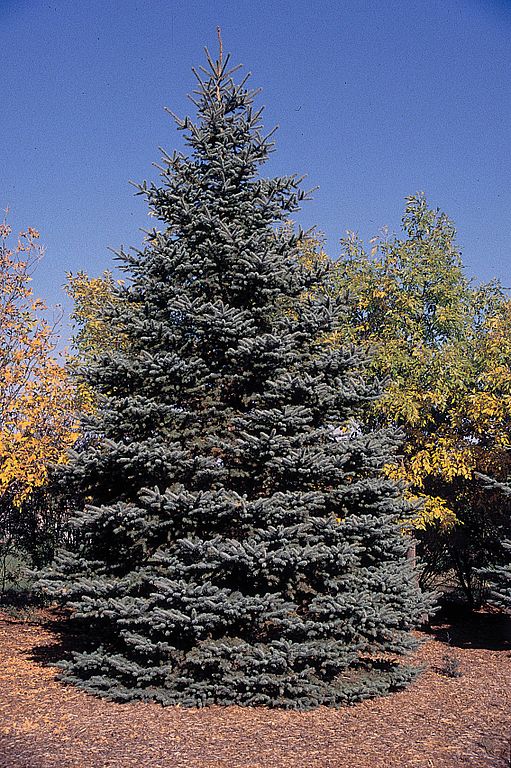
Blue Spruce (Picea pungens) is among the most visually stunning trees, celebrated for its striking silvery-blue needles. This evergreen tree typically reaches heights of 30-60 feet and possesses a conical shape that adds architectural interest to gardens. Its needle-like foliage remains vibrant throughout the year, providing consistent beauty and privacy even during the cold winter months.
One of the benefits of Blue Spruce is its dense growth habit, which makes it an excellent choice for creating a solid visual barrier. The thick foliage effectively blocks out sightlines and noise, making it a preferred option for those looking to shield their homes and gardens from the outside world. Additionally, Blue Spruce is known for its impressive durability; it can withstand a range of environmental conditions, from drought to cold temperatures, making it suitable for various regions.
A versatile option, Blue Spruce can be planted individually as an accent tree or in clusters to form a powerful hedge. Its symmetrical form and striking color can create a dramatic backdrop against which other plants can shine. Furthermore, the tree supports local wildlife, attracting birds and small creatures to your garden, enhancing its ecological value while providing effective privacy.
Canadian Hemlock
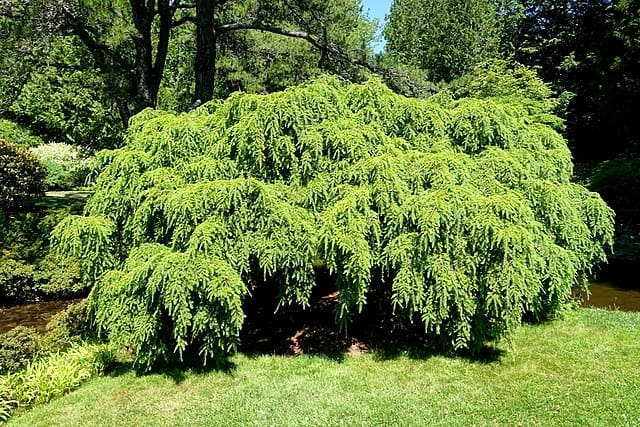
The Canadian Hemlock (Tsuga canadensis) is a beautiful and graceful evergreen that stands out for its soft, feathery foliage and elegant, pendulous branches. This tree grows to a height of 40-70 feet and features a pyramidal shape that lends itself well to creating a lush privacy screen. The delicate, needle-like leaves are dark green on top, with a silvery underside, giving the tree a captivating multicolored effect.
Canadian Hemlocks thrive in shaded to partially shaded areas and prefer moist, well-drained soils, making them ideal for more temperate regions. Their ability to tolerate shade allows for creative planting options, such as using them as understory trees in woodland gardens. When grouped together, they develop a dense canopy that provides an effective privacy barrier while creating a serene, woodland atmosphere.
One of the remarkable benefits of Canadian Hemlocks is their longevity and resilience. With proper care, they can live for several decades, offering enduring privacy and beauty to your landscape. Their adaptability to various garden styles, from traditional to contemporary, coupled with their attractive, lush growth, makes them a compelling choice for homeowners looking to enhance their privacy naturally.
Chinese Juniper
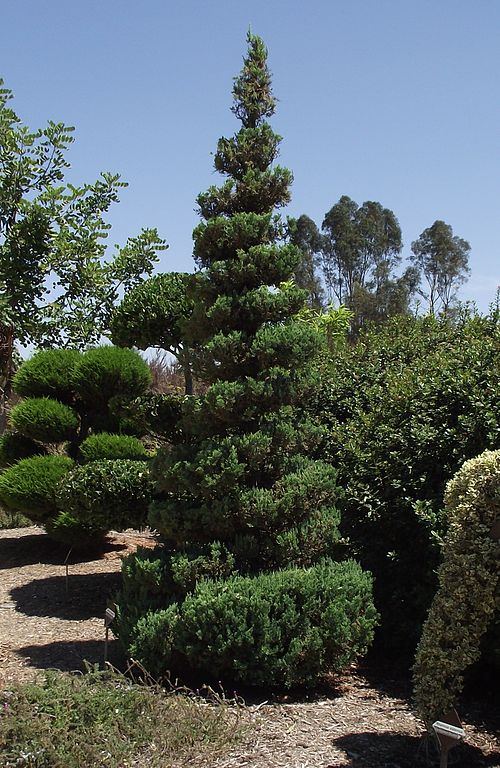
The Chinese Juniper (Juniperus chinensis) is a versatile and hardy evergreen known for its adaptability and varied forms. It can grow as a tree, shrub, or ground cover, making it an excellent option for different landscaping needs, from creating a taller privacy screen to lower hedges or borders. Depending on the specific variety, Chinese Junipers can reach heights between 10 to 30 feet while spreading outwards for a more substantial coverage area.
One of the defining characteristics of Chinese Juniper is its unique needle and scale-like leaves that offer texture and visual interest. The rich green to bluish-green foliage provides a backdrop for its attractive berries, which many birds find appealing. This tree’s dense growth pattern contributes to its effectiveness as a privacy screen, allowing for a solid barrier that helps reduce noise and protect against wind.
Chinese Juniper is exceptionally drought-tolerant once established, making it ideal for regions with varying moisture levels. It’s also resistant to pests and diseases, resulting in a low-maintenance option for homeowners who desire privacy without extensive upkeep. The diverse range of available cultivars enables landscaping versatility; you can choose from upright forms for dramatic vertical privacy or cascade varieties for soft, flowing hedges.
Concolor Fir
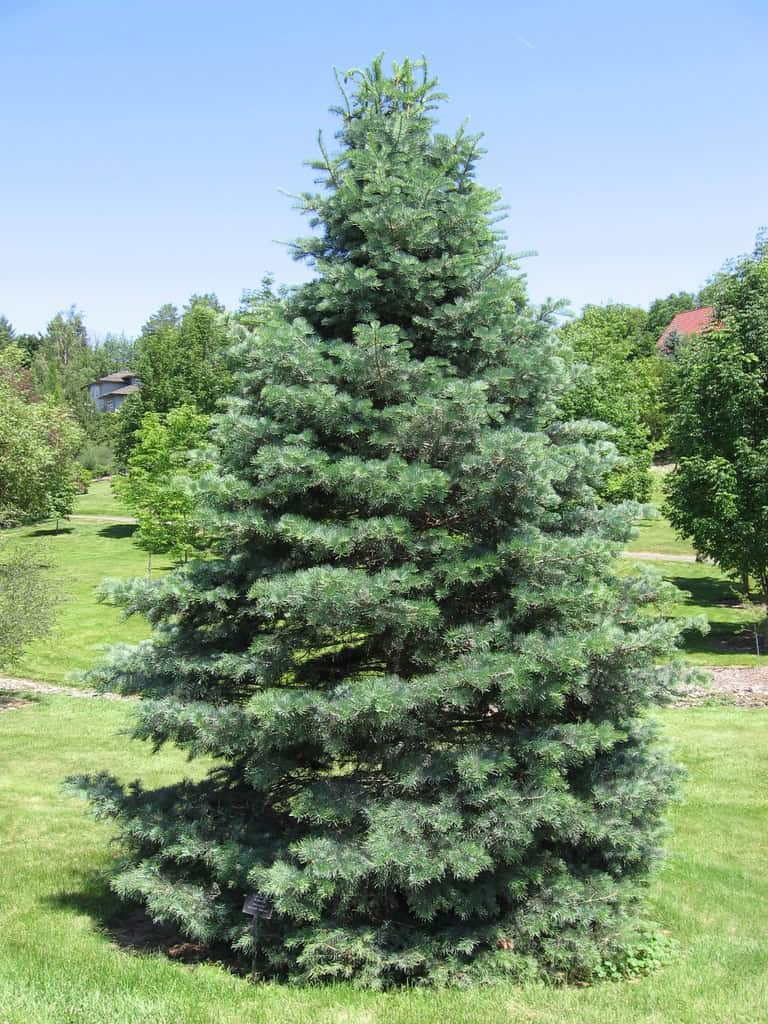
The Concolor Fir (Abies concolor), also known as the white fir, is a stunning evergreen known for its soft, silvery-blue needles and perfectly conical form. Typically reaching heights of 30-50 feet, this tree is an excellent option for those looking to establish a significant privacy screen without overwhelming their landscape. The foliage emits a pleasant citrus-like scent when crushed, adding a sensory layer to your garden experience.
One of the defining strengths of Concolor Fir is its tolerance for a variety of soil types, from sandy to loamy, as well as its adaptability to different moisture levels. This flexibility allows it to thrive in diverse regions across North America, making it accessible for many homeowners seeking a robust privacy tree. The tree’s dense growth habit effectively blocks views, creating a lush barrier that can also reduce noise pollution, making your outdoor space feel more secluded and serene.
In addition to its remarkable privacy-enhancing qualities, the Concolor Fir is visually attractive, with its soft blue-green needles providing a stunning contrast against other landscape elements. This species can serve beautifully as a standalone specimen tree or be planted in rows to form a well-defined privacy screen. Furthermore, it supports local wildlife, offering shelter and habitat for birds and other small creatures, enhancing the ecological balance of your garden.
Deodar Cedar
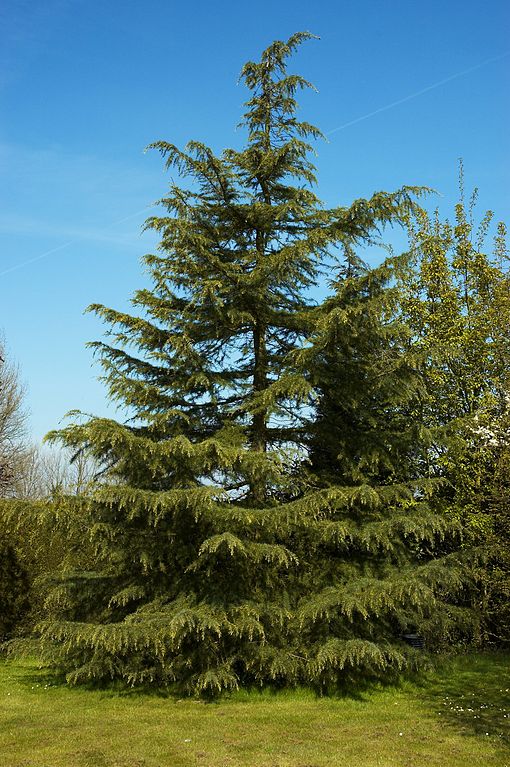
The Deodar Cedar (Cedrus deodara) is a majestic tree known for its sweeping branches and graceful, drooping silhouette. Growing up to 40-70 feet, this striking evergreen is perfect for creating a dramatic visual barrier while establishing privacy. The tree features soft, needle-like leaves that range from bright green to blue-green, contributing to its overall allure.
Originally native to the Himalayas, the Deodar Cedar thrives in well-drained soils and prefers full sunlight, but it can also tolerate light shade. Its distinct architecture allows it to serve as a focal point in any garden, while its expansive canopy provides excellent coverage. The Deodar Cedar’s dense foliage creates effective screening, making it an ideal choice for homeowners looking for both beauty and function in their privacy trees.
This species not only serves a practical purpose but also adds a touch of elegance to landscapes. The sweeping branches create a beautiful, layered effect and can provide shade during hot summer months. Additionally, the tree’s ability to withstand drought conditions makes it suitable for environmentally-friendly landscaping. Its longevity and minimal maintenance requirements further solidify its position as a highly desirable option for establishing privacy.
Douglas Fir
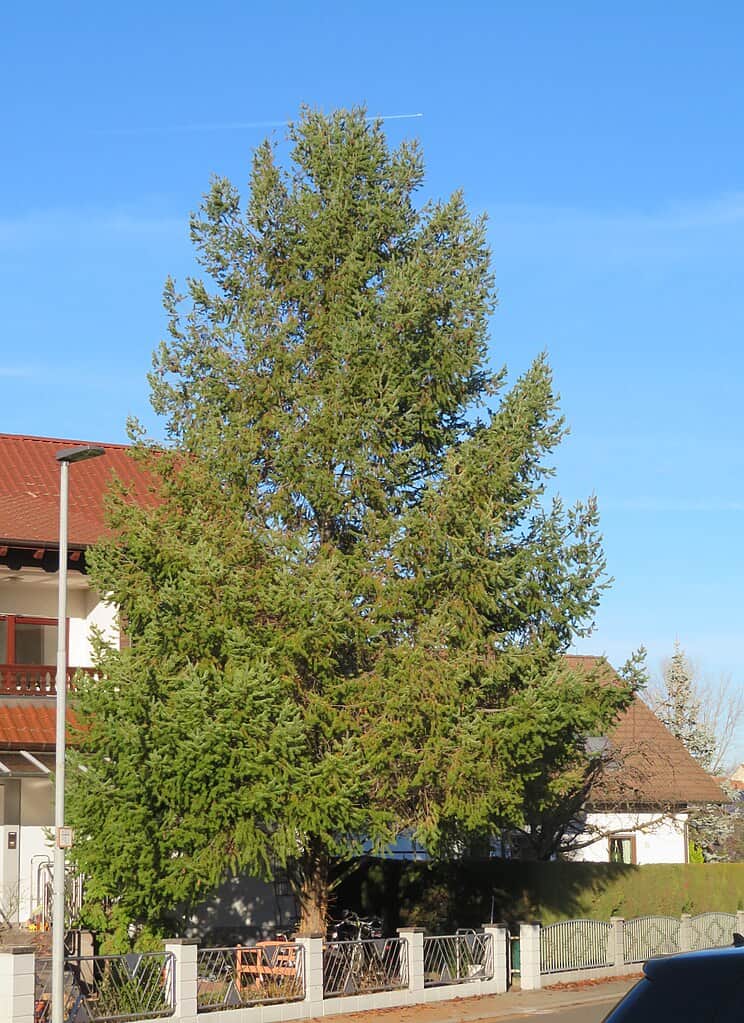
The Douglas Fir (Pseudotsuga menziesii) is a classic evergreen known for its impressive height and strong, symmetrical shape. This tree can reach up to 70-100 feet, providing a significant presence in any landscape. With its soft, green needles and distinctive cone shape, the Douglas Fir not only serves as an excellent privacy barrier but also adds an evergreen beauty to your yard.
One of the foremost advantages of Douglas Fir is its rapid growth rate, making it a quick option for those who want to establish privacy without waiting for years. Under healthy conditions, this tree can shoot up several feet per year, quickly transforming open spaces into secluded areas. Its dense needles create a thick wall of greenery that effectively screens out neighbors and unwanted views.
Douglas Fir is particularly adaptable to various climates and soil types, showing resilience in both drought-prone locations and regions with heavier moisture. Its sturdy branches and strong structure are capable of withstanding strong winds, making it a robust addition to any property. Moreover, like many evergreens, Douglas Fir supports wildlife, attracting a variety of birds and insects that contribute to the local ecosystem.
Eastern Red Cedar
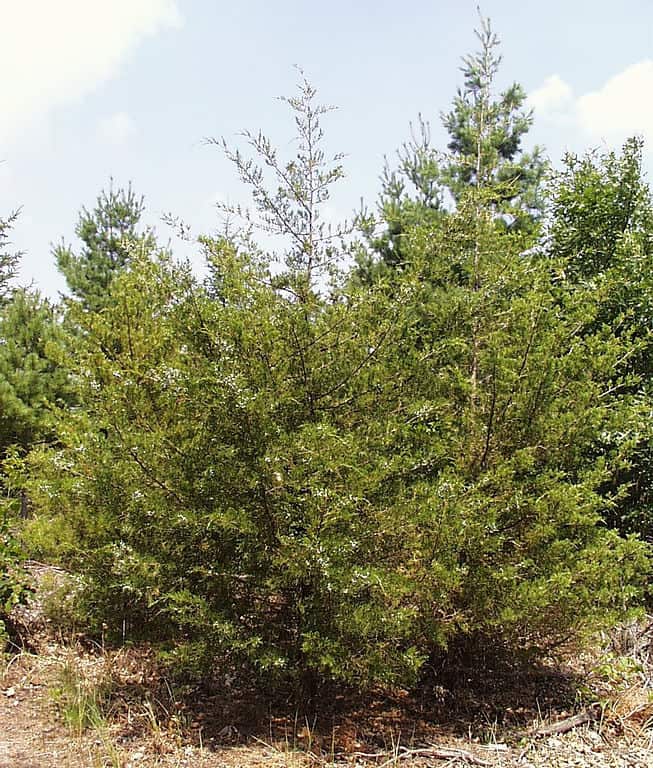
Eastern Red Cedar (Juniperus virginiana) is a hardy and versatile tree valued for its aromatic wood and dense foliage. Typically reaching heights of 30-50 feet, this tree features a conical shape with vibrant, scale-like leaves that transition from green to a bluish-gray hue throughout the seasons. This adaptability to different soil types and climates, combined with its resilience to drought, makes it a stellar choice for homeowners across a range of landscapes.
The Eastern Red Cedar is particularly noted for its ability to create a formidable privacy barrier. Its thick, bushy trunk and dense branches effectively block views and noise, providing a serene atmosphere in your backyard. Additionally, the tree’s natural resistance to pests and diseases helps ensure its longevity and minimal maintenance needs.
Beyond its functional attributes, the Eastern Red Cedar is visually appealing year-round. As it matures, it develops attractive reddish-brown bark that peels away in strips, adding texture and interest to your landscape. This species is also a haven for local wildlife; its berries attract birds while its sheltering branches provide nesting sites, enhancing the ecological diversity of your property.
False Cypress
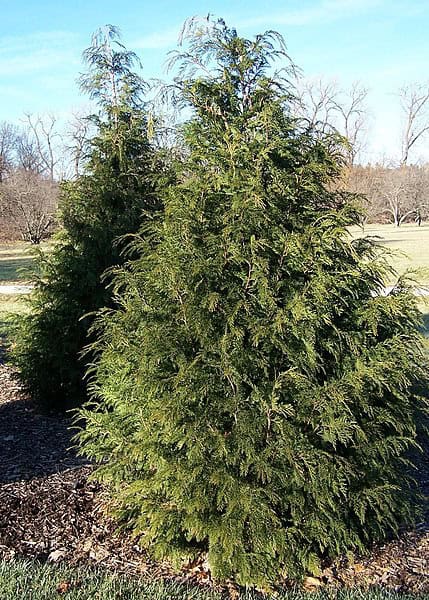
False Cypress (Chamaecyparis spp.) is a group of trees known for their graceful forms and lush, fern-like foliage. Among the various species, the most common for privacy screening are the Japanese False Cypress (Chamaecyparis obtusa) and the Lawson False Cypress (Chamaecyparis lawsoniana). These trees can range from 25 to 70 feet in height, depending on the variety, and exhibit a variety of colors, including green, blue-green, and golden hues.
One of the standout features of False Cypress is its rich texture, which adds visual depth to any garden. The soft, scale-like leaves create a thick canopy that effectively shields against wind and sightlines, making it an ideal candidate for privacy. Additionally, False Cypress exhibits excellent adaptability; it thrives in both moist, well-drained soils and drier conditions, making it suitable for a wide range of climates.
Furthermore, False Cypress trees tend to have a moderate growth rate, allowing you to enjoy privacy relatively quickly without overwhelming your landscape. Their natural ability to tolerate shade enables homeowners to place them in a variety of locations within the garden. The stately appearance of a false cypress not only contributes to a privacy screen but enhances the elegance of your outdoor space.
Italian Cypress
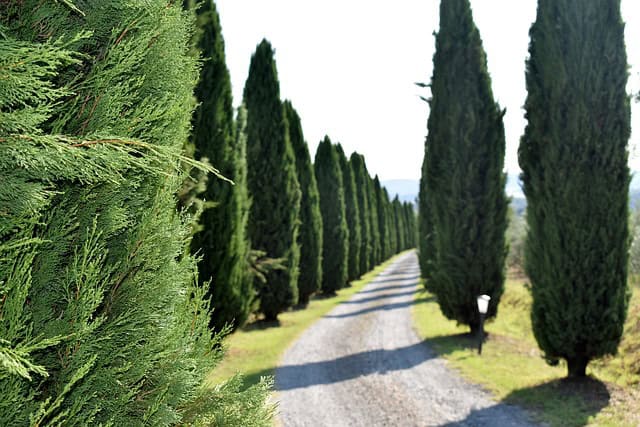
Italian Cypress (Cupressus sempervirens) is a quintessential tree that embodies elegance and verticality, reaching heights of 40-60 feet with its tall, narrow silhouette. Known for its dense, columnar growth, this evergreen is particularly admired for its ability to create dramatic vertical lines in the landscape, making it a popular choice for formal gardens and Mediterranean-inspired settings.
The Italian Cypress thrives in full sun and well-drained soils, preferring drier conditions, which makes it a resilient option for gardeners in regions with lower rainfall or drought-prone areas. Its dense foliage acts as an effective privacy barrier, cleverly blocking sightlines while maintaining an airy ambiance within the garden. Because of its compact form, Italian Cypress can be planted close together, enabling homeowners to create a striking, continuous privacy screen.
Beyond its functional role, the Italian Cypress is stunning when accentuated with strategic landscaping. It pairs well with other plants, particularly flowering shrubs and perennials, enhancing the visual appeal of the surrounding garden. Additionally, its adaptability to urban environments makes it a favored choice for those looking to enhance privacy in smaller spaces.
Japanese Cedar
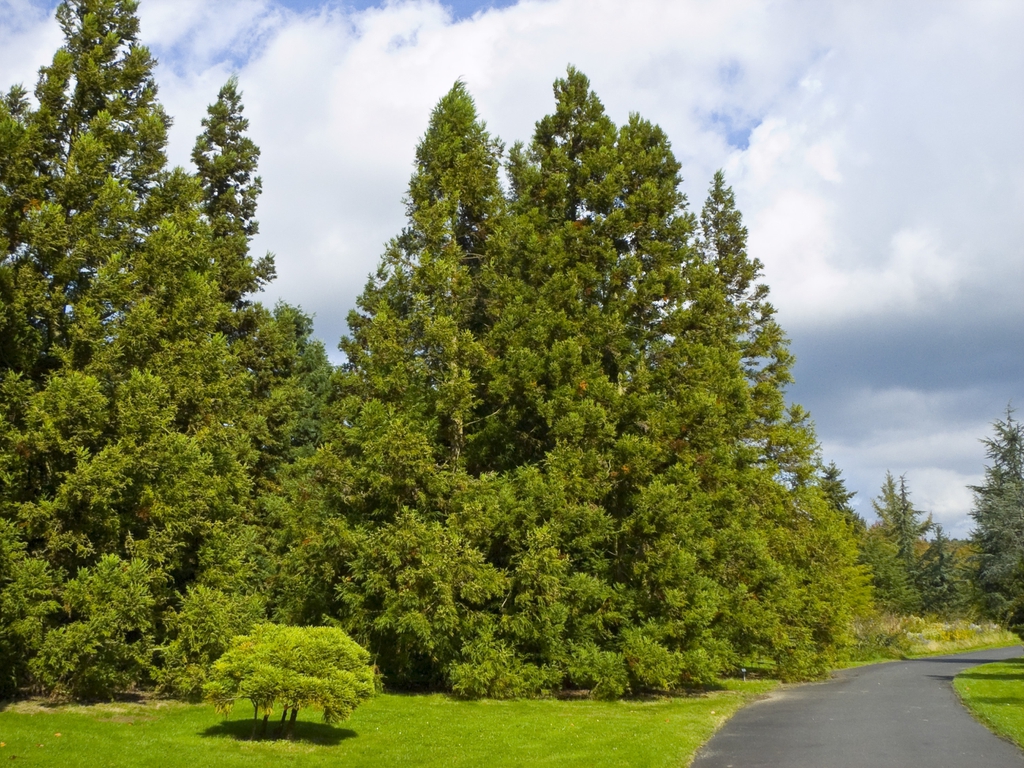
Despite its name, Japanese Cedar (Cryptomeria japonica) is not a true cedar but rather a conifer that offers a host of privacy benefits. Typically growing to heights of 50-70 feet, this tree showcases soft, feathery foliage that emerges in a vibrant green, maturing to a rich, dark green hue. Its pyramidal shape and lush growth make it an excellent addition to any landscape in need of a privacy screen.
One of the standout features of Japanese Cedar is its exceptional ability to thrive in a variety of soil conditions, including clay and sandy soils. It prefers moist environments and can tolerate some shade, making it a versatile choice for different garden situations. When planted in groups or as a hedge, Japanese Cedar creates a thick, lush barrier that effectively blocks unwanted views and noise.
Beyond its remarkable privacy qualities, Japanese Cedar adds significant aesthetic value to your landscape. The unique bark is a reddish-brown color that peels in strips, enhancing the visual interest of the tree as it matures. Additionally, this species is relatively low-maintenance, as it is resistant to many pests and diseases. It also attracts wildlife, providing habitat and food sources for various birds and small animals, contributing to the ecological richness of your garden.
Korean Fir
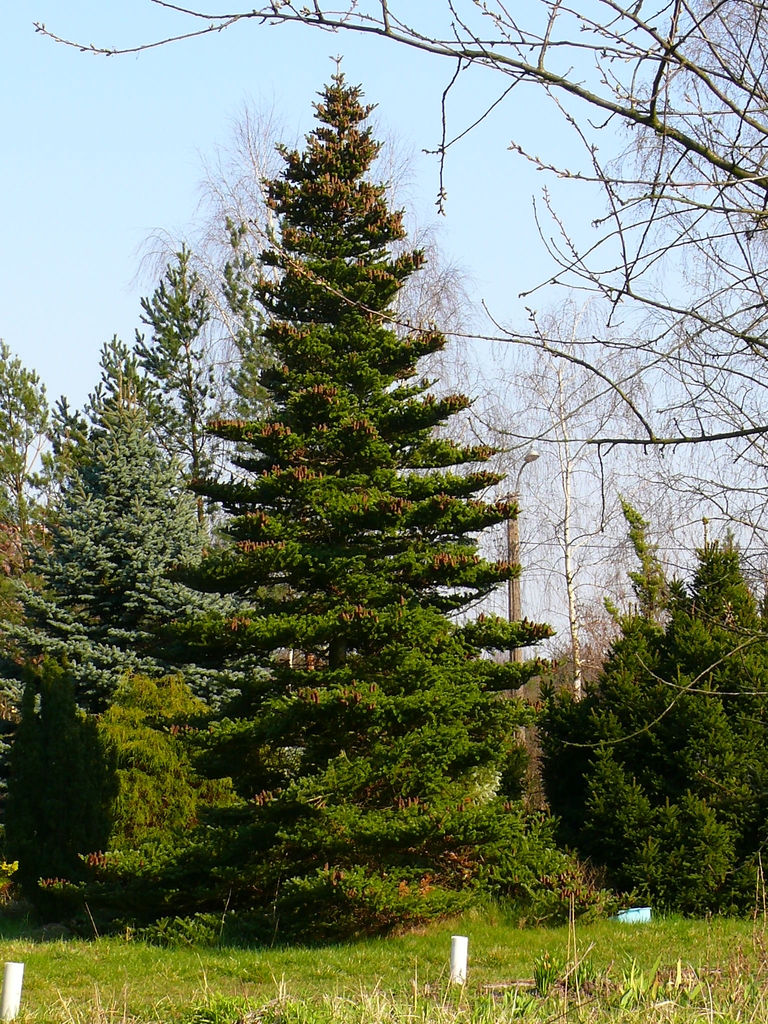
Korean Fir (Abies koreana) is a striking conifer celebrated for its beautiful appearance and dense growth habit. Reaching heights of 30-50 feet, this tree features attractive, dark green needles with silver undersides, creating a stunning contrast that enhances any landscape. The compact, conical shape of Korean Fir makes it a fantastic choice for privacy screens, especially in smaller spaces where height and aesthetics are both important.
This fir species is well-adapted for colder climates, thriving best in well-drained, acidic soils. Korean Fir exhibits slow to moderate growth, gradually developing robust branches that provide effective coverage. Its thick, evergreen foliage contributes significantly to creating a visual barrier, allowing homeowners to enjoy their outdoor spaces without the intrusion of nearby views.
Another compelling feature of Korean Fir is its remarkable cones, which are often purple when young, maturing to a stunning brown. This unique trait adds an ornamental aspect to the tree, enhancing its year-round appeal. Furthermore, Korean Fir is relatively low-maintenance and less susceptible to pests compared to other conifers, allowing for a more straightforward care routine. The tree’s ability to provide shade and shelter to wildlife adds further ecological value to your garden.
Leyland Cypress
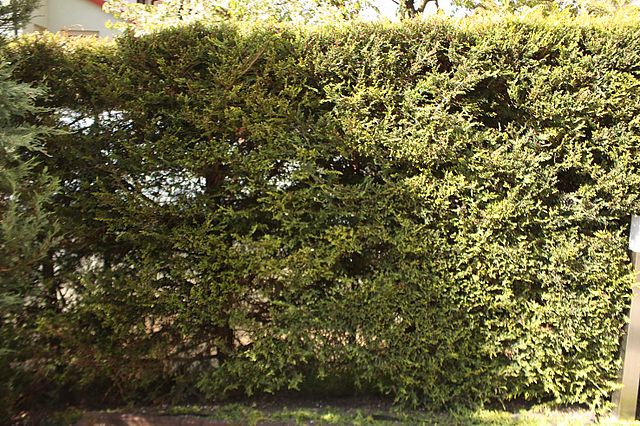
Leyland Cypress (× Cupressocyparis leylandii) is often a top choice for privacy hedges and windbreaks due to its rapid growth and dense foliage. This hybrid tree can reach heights of 40-70 feet, establishing a robust, towering presence that effectively blocks unwanted sightlines within just a few years. Known for its lush, feathery leaves that have a vibrant green color, Leyland Cypress develops a conical shape that not only enhances privacy but also adds a visually appealing element to residential gardens.
One of the most compelling aspects of Leyland Cypress is its adaptability to various soil types and environmental conditions. It thrives in well-drained soils and is tolerant of both drought and soil salinity, making it an ideal choice for different regions and climates. This resilience, combined with its ability to withstand heavy pruning, allows homeowners to manage the height and shape of their privacy screen according to their spatial needs.
Additionally, Leyland Cypress is known for its impressive noise reduction capabilities, creating a sound barrier that contributes to a more tranquil outdoor experience. When planted in tight rows, these trees form an effective living fence, blocking both sound and vision. Their relatively low maintenance requirements further increase their appeal, as they only need occasional trimming to maintain their desired shape. By incorporating Leyland Cypress into your landscape, you can create a fast-growing privacy solution that blends seamlessly with nature.
Norway Spruce
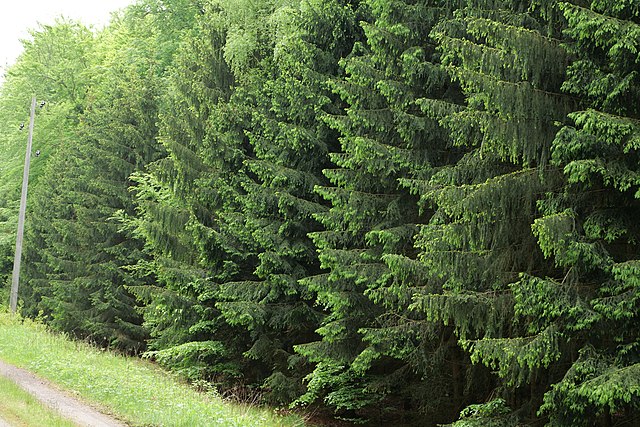
Renowned for its strength and hardiness, Norway Spruce (Picea abies) is a magnificent tree that can grow up to 50-100 feet tall, making it a robust option for creating substantial privacy. This tree features sweeping, drooping branches adorned with dark green needles, which not only offer visual appeal but also serve as an excellent barrier against external views. The conical shape of Norway Spruce provides a classic silhouette that enhances both rural and urban gardens alike.
This species is well-suited to cooler climates and is known for its adaptability to various soil conditions, including sandy and clay soils. Norway Spruce grows more slowly in its early years but becomes a vigorous grower as it matures, ultimately providing a thick, dense shield. Its ample foliage effectively absorbs sound, making it an ideal choice for noise reduction in busy areas.
In addition to its privacy benefits, Norway Spruce contributes to wildlife habitats by providing shelter and food sources for birds and small mammals. The tree’s cones, which are often a rich brown color, add interest throughout the seasons and cultivate a rustic element in your landscape design. Norway Spruce requires minimal care once established, needing only occasional pruning to remove dead or unhealthy branches. By introducing this magnificent conifer into your yard, you can achieve both privacy and ecological harmony, ensuring your garden remains a vibrant and serene space.
Thread Branch Cypress
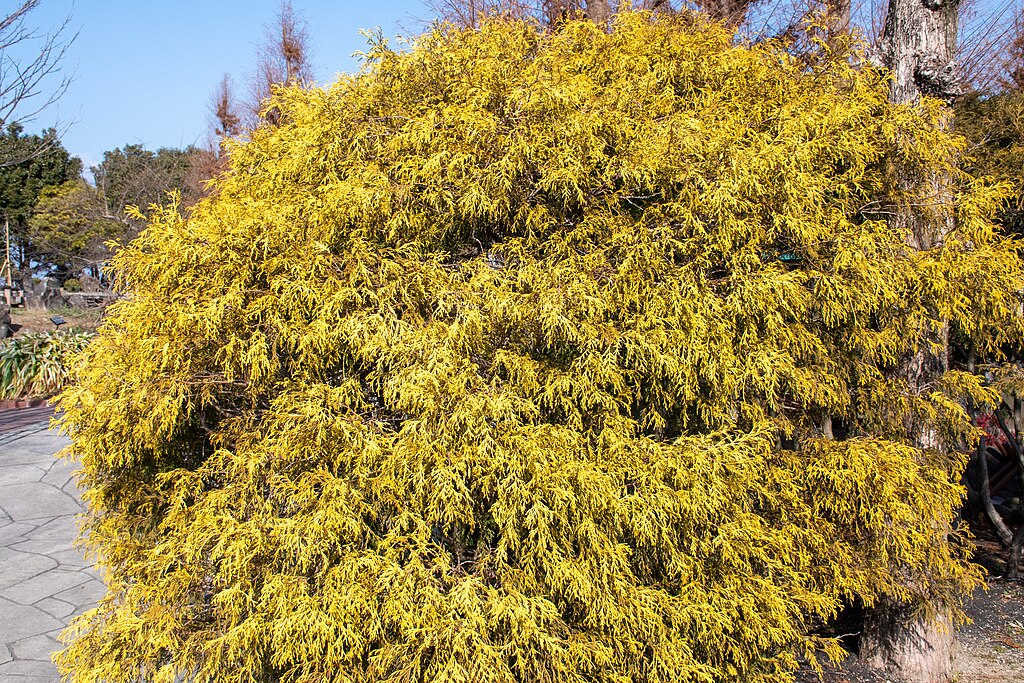
Thread Branch Cypress (Chamaecyparis pisifera ‘Filifera’), commonly known for its delicate, lace-like foliage, offers a unique twist on traditional privacy trees. This variety typically grows to heights of 10-20 feet, making it an excellent choice for a compact privacy screen or ornamental hedge. The tree’s slender, thread-like branches create a cascading effect, which adds visual interest and a sense of softness to the landscape.
What sets Thread Branch Cypress apart is its adaptability to various growing conditions, including wet and well-drained soils, and its resilience to urban environments. It thrives in full sun and partial shade, offering flexibility for garden design. When planted in a row, this cypress can form an enchanting curtain that not only obscures views but also allows gentle breezes to pass through, enhancing the sense of serenity in your outdoor space.
Moreover, the unique texture of Thread Branch Cypress makes it a favorite among landscape designers. Its graceful branches can be used to create stunning focal points or to soften the edges of a garden. As an evergreen, it maintains its beauty throughout the year, adding a lush, vibrant backdrop to your garden scheme. Incorporating Thread Branch Cypress into your landscape not only provides effective screening but also elevates the aesthetic appeal of your outdoor area through its distinctive form.
Western Red Cedar
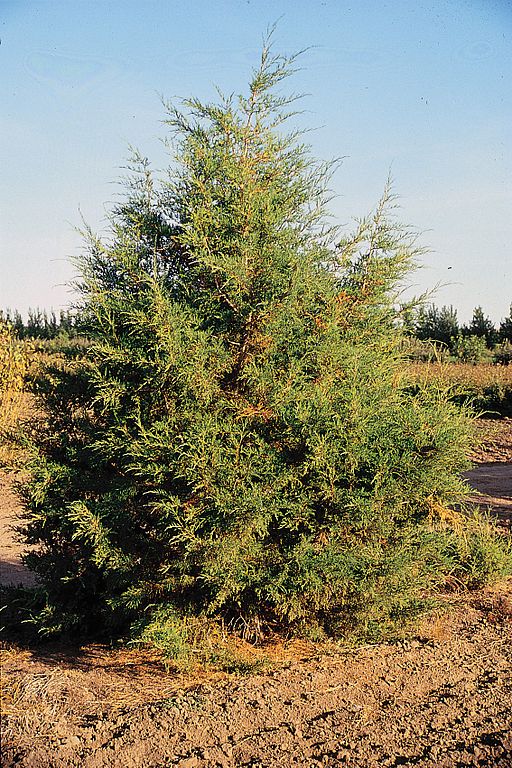
Western Red Cedar (Thuja plicata) is renowned for its fragrant wood and graceful stature, making it a classic choice for those seeking privacy in their gardens. With a mature height of 50 to 70 feet, this tree is particularly suited for larger properties and can effectively mask unwanted views from above. Its thick, vertically-oriented foliage creates a dense barrier, providing both privacy and sound reduction.
Western Red Cedar thrives in a range of soils, particularly those that are moist and well-drained, and it prefers full sun to partial shade. This tree is relatively fast-growing, making it a desirable option for homeowners looking for quicker results in privacy landscaping. Additionally, its resilience to pests and diseases makes it a low-maintenance choice, requiring minimal care once established.
Beyond its practical applications, Western Red Cedar is a beautiful addition to any landscape. The tree’s soft, flat needles are often a bright green, turning to a warm browny-red as they age, creating a stunning visual contrast throughout the seasons. Furthermore, the aromatic wood is valuable for various uses in construction and woodworking, adding to its practical appeal. By planting Western Red Cedar, you not only enhance your outdoor privacy but also introduce a tree that offers both beauty and utility to your landscape design.
White Pine
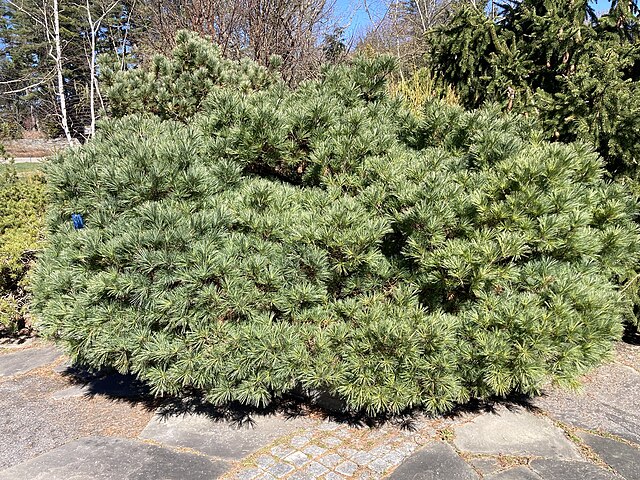
White Pine (Pinus strobus) is an iconic tree known for its impressive height and graceful, elongated needles that can reach lengths of 3-5 inches. This majestic conifer can grow up to 80 feet tall, making it an ideal candidate for larger properties seeking a towering privacy screen that can stand out as a dominant feature in the landscape. With a nearly pyramidal shape when young, White Pine develops a more open crown as it matures, allowing for a spacious and airy quality while still providing effective coverage.
White Pine is adaptable to a variety of soil conditions, thriving in both sandy and clayey soils, and it prefers full sun. It is relatively fast-growing, allowing homeowners to quickly establish a robust screening that provides not only privacy but also shelter for wildlife. Birds and small animals find refuge in its long branches, which can enhance the ecological aspect of your property.
The soft texture of White Pine needles provides a visually appealing backdrop that can complement other plants and flowers in your garden. Its light green to blue-green needles create a serene aesthetic, offering a calming effect year-round. Furthermore, the tree’s appealing bark, which matures from a smooth grayish-green to a more rugged brown as it ages, adds another level of character to the landscape. By incorporating White Pine into your garden, you are not just enhancing privacy but also fostering a tranquil retreat that invites natural beauty and wildlife activity.
Yew
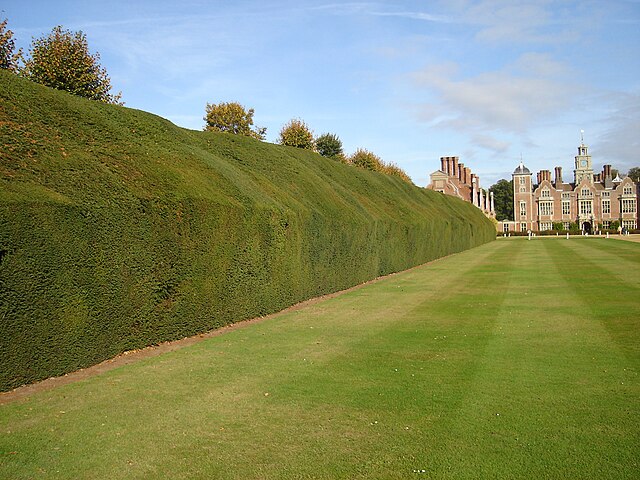
Yew trees are renowned for their ability to thrive in a variety of conditions, making them one of the most adaptable options for privacy screening. Depending on the species, Yews can range in size from compact shrubs to taller trees, reaching heights of 10-30 feet or more. Their dense, dark green needles remain lush throughout the year, providing excellent coverage that effectively blocks sightlines and noise from adjacent properties or roads.
One of the most compelling qualities of Yew is its exceptional tolerance to pruning, enabling it to be shaped into formal hedges or left to grow more naturally as a tall privacy screen. This flexibility allows homeowners to control the height and density of their Yew hedges, accommodating various landscape styles and personal preferences. Additionally, Yew will thrive in both sun and shade, giving it the versatility to be planted in a variety of garden settings, from sunny estates to shaded woodlands.
Yews also possess a unique beauty that sets them apart from other privacy options. The rich green foliage has a soft texture, while the shallow root system makes Yews suitable for planting close to foundations and structures without causing damage. In addition to their aesthetic qualities, Yews produce bright red berries that attract birds and other wildlife, enhancing the ecological value of your garden.
Furthermore, Yews are known for their longevity, some individuals enduring for several hundred years, symbolizing resilience and a connection to nature. This long lifespan not only contributes to the sustainable aspect of planting Yews but also signifies the creation of a lasting privacy solution. However, it is essential to note that the seeds and leaves of the Yew can be toxic if ingested, so placing them away from children and pets is advisable.


